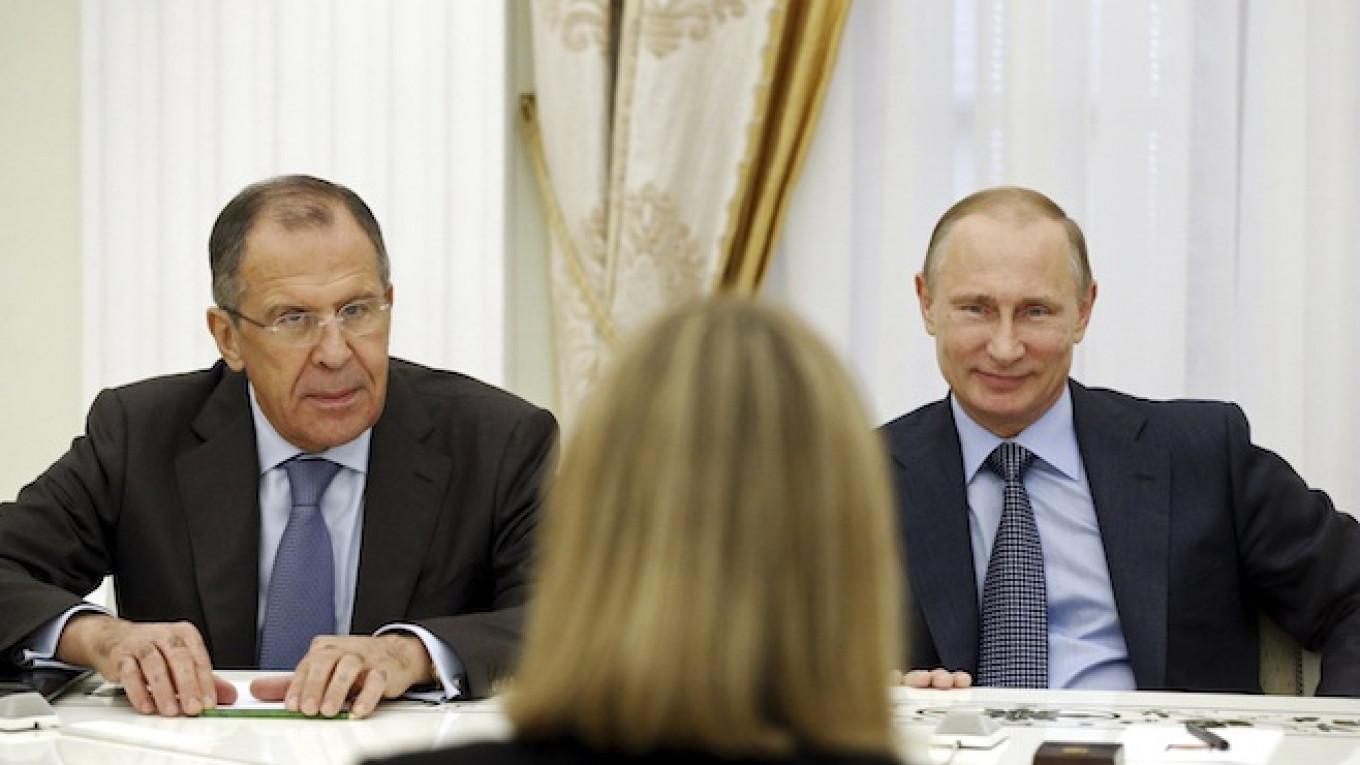BRUSSELS — Germany and Italy have most to lose if the European Union makes good on its threat to impose harsher sanctions on Moscow, while Britain's overseas territories are soaking up the lion's share of capital streaming out of Russia.
The picture emerging from United Nations and European Union data shows the impact of restricting trade with Russia would be far from even, with Germany dwarfing others' exposure and those urging sanctions loudest, such as Sweden, having less at stake.
That makes an EU plan to consider limiting Russian access to European defense and energy technology more difficult, despite pressure from the United States after the downing of a Malaysian airliner over the conflict zone in eastern Ukraine.
Wary of antagonizing its main gas supplier, the EU has used travel bans and asset freezes so far in reaction to Russia's annexation of Crimea and support for separatists in Ukraine.
Ministers agreed on Tuesday that those measures may be widened if Moscow does not cooperate with an investigation into the plane crash and fails to stop weapons flowing into the country.
Limiting trade would be damaging because the 28-nation EU sold goods worth 120 billion euros ($161.7 billion) to Russia last year, even if that was only 7 percent of the bloc's annual exports, according to the EU statistics office Eurostat.
Germany, Europe's biggest economy, accounted for one-third of sales to Russia, around 36 billion euros ($48.5 billion). Many of those goods could be restricted by sanctions: manufactured products including those used in defense and energy.
EU governments are split over tougher sanctions, largely depending on the closeness of their ties with Russia. Germany is the swing state given its position at the heart of Europe and its weight as the EU's most populous country.
Britain, Poland and Sweden lead a group pushing for economic sanctions, and whose combined total exports to Russia are less than the size of those of Germany.
Some 6,200 German firms are active in Russia with 20 billion euros ($27 billion) of investments there, while around 300,000 German jobs are dependent on trade with Russia, according to Germany's Committee on Eastern European Economic Relations.
"More sanctions increase the price all of us have to pay for this conflict," Eckhard Cordes, the committee's chairman, told Reuters.
HeidelbergCement, which does business in Russia, echoed that sentiment and a spokesman for the company said that while it would accept sanctions, "economically there will only be losers because both sides will suffer damages."
Still, the Baltic countries, which won their independence from the Soviet Union two decades ago, are the most vocal about the need for sanctions against Russia despite strong trade ties.
Almost three-quarters of Latvia's drinks and tobacco exports go to Russia, while Lithuania sells a third of its food and live animals there. But the Baltics are eager to diversify away from Moscow. Lithuania will join its Baltic neighbors Latvia and Estonia in the euro zone from next year, cementing a shift westwards.
The $94 Billion Money Trail
Italy is among the states most strongly resisting tougher restrictions on Russia, along with Greece and Cyprus.
Italian exports to Russia were second only to Germany's last year at nearly 11 billion euros ($14.8 billion), double those of Britain and larger than the 8 billion euros ($10.8 billion) of the Netherlands, which has shifted to the pro-sanctions camp after 193 of its citizens were killed in the plane disaster.
The Netherlands, a nation of 15 million, has an outsized share of imports from Moscow and foreign direct investment flows to Russia because of its position as an oil and commodities trading hub and a tax-efficient base for offshore corporations.
Much of the Italian sales were manufactured goods, transport machinery and chemicals — the kind of sophisticated products Russia's raw materials-dominated economy needs.
"Sanctions are always a problem both for those who are subjected to them and those who impose them," Italian Economy Minister Pier Carlo Padoan told reporters in Brussels.
Italy's allies include southern European countries such as Cyprus, which stands to lose from sanctions because of the billions of euros Russian oligarchs have invested there.
Of $94 billion in outward foreign direct investment by Russian residents in 2013, $11 billion ended up in Cyprus, according to U.N. and World Trade Organization data.
Cyprus, where light regulation and cultural ties through Orthodox Christianity have long attracted the capital and savings of Russians, was only second to the British Virgin Islands, which took in $61.7 billion last year.
Wealthy Russians took a hit when the euro zone imposed losses on big bank depositors in return for a 10 billion euro ($13.5 billion) bailout of Cyprus last year after a banking meltdown.
See also:
One in 4 German Companies With Foreign Business Hit by Russia Sanctions
A Message from The Moscow Times:
Dear readers,
We are facing unprecedented challenges. Russia's Prosecutor General's Office has designated The Moscow Times as an "undesirable" organization, criminalizing our work and putting our staff at risk of prosecution. This follows our earlier unjust labeling as a "foreign agent."
These actions are direct attempts to silence independent journalism in Russia. The authorities claim our work "discredits the decisions of the Russian leadership." We see things differently: we strive to provide accurate, unbiased reporting on Russia.
We, the journalists of The Moscow Times, refuse to be silenced. But to continue our work, we need your help.
Your support, no matter how small, makes a world of difference. If you can, please support us monthly starting from just $2. It's quick to set up, and every contribution makes a significant impact.
By supporting The Moscow Times, you're defending open, independent journalism in the face of repression. Thank you for standing with us.
Remind me later.


